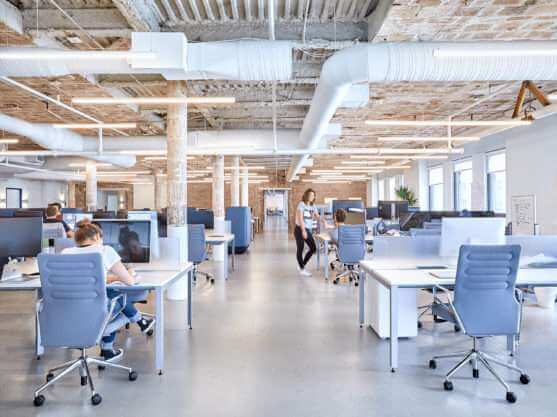It’s difficult to design an office environment perfectly. To design a space that will be pleasant and effective for you and your staff requires a lot of time, imagination, and effort. It may be really difficult to know where to begin when there are so many different things to take into account. There is no one-size-fits-all approach to office space design since every business is unique. Fortunately, there are certain overarching guidelines you can adhere to create the ideal environment for your company. In order for you to reap the rewards of constructing the ideal office space, we want to share some of our best advice with you today.
Private Workspaces
Although open-plan office layouts are great for modern businesses and great for encouraging employee engagement and cooperation, they could have a negative impact on productivity. Open workplaces can produce high noise levels that distract workers from their work. Productivity declines as a result, therefore private workspaces are the best choice for the office. You can include one of the several options seen at this link and effectively reduce the echo and absorb the sound in the office. Closed workstations will enable workers to have extended and in-depth discussions about their tasks. They won’t be distracted from their task by people nearby. Private workstations also allow for private conversations and interviews.
Choose Natural Light
The era of endless rows of white fluorescent lights is over. We are aware that natural light has a positive impact on human health. Your team members’ moods will improve as a result of the natural light, and they will be attentive and productive for longer periods of time. While adding windows to every workplace is probably not practicable, you may equip your workstations with lighting that emits gentler wavelengths. By utilizing the lighting alternatives offered in today’s market, you may harness the power of natural light. Modern technology makes it possible for workplace lighting to switch automatically from the morning’s cooler greens and blues to the afternoon’s warmer yellows and reds. As a result, you may alter the color temperature of your workplace lighting to reflect the environment outside.
Create a Space for Relaxing
An office section that offers a place to unwind is known as an office relaxation space. In order to feel comfortable, it often has seats, lighting, and other design aspects. Due to the hectic workplace, there is a rising need for a relaxing area in the office. The value of a relaxation room in the workplace lies in how it affects the mental and even physical health of the staff. Everyone has a different way of unwinding; some individuals enjoy reading, some enjoy napping, and others enjoy doing yoga or meditation. To alleviate stress levels, these hobbies ought to be promoted at work.
Add Plants
A lot can be changed by adding office plants; they offer the area character and have even been found to boost happiness and productivity. Don’t trust us? There are several studies available. Even the theory that plants lessen stress has been put forth. However, nothing is more depressing than a dying office plant. Remember to water them and adhere to the maintenance guidelines. If you work in a tech-heavy business or are located in an area without many green areas, plants might assist in calming you down and provide the impression that the office is a little more natural. It’s also a great idea to use them to adorn a common break room or welcome clients in a waiting area.
Be Color-Conscious
Colors contribute to the workspace’s functionality as well as its visual appeal. They could be more significant than you imagine. Colors have been connected to emotions and productivity in several studies. It might be easier to create the outcomes you want if you know which colors have what kinds of impacts on the environment at work. Avoid using white, which is typically the color used for workplace walls, at all costs. Experimenting with your office’s color scheme might help you encourage a productive work atmosphere. Green is associated with creativity, red with attention to detail, and blue with productivity. A word of warning: having too much of something may be exhausting and unhelpful.
Include Art
It has been proven that having art in the workplace boosts creativity and productivity. Businesses are becoming more and more aware of the advantages of having art in the workplace. It improves the aesthetics and gives the individuals who work there something to be proud of. What types of artists ought you to seek out? First, consult your team. Find something nice but distinctive.
There is no solution to workplace layouts, design, or functioning that works for everyone since no two employees are the same. What will make your employees’ workspace perfect is providing them with the freedom to not be in the office for the entire workday, allowing them to have some privacy, and giving them space to be creative and breathe.
